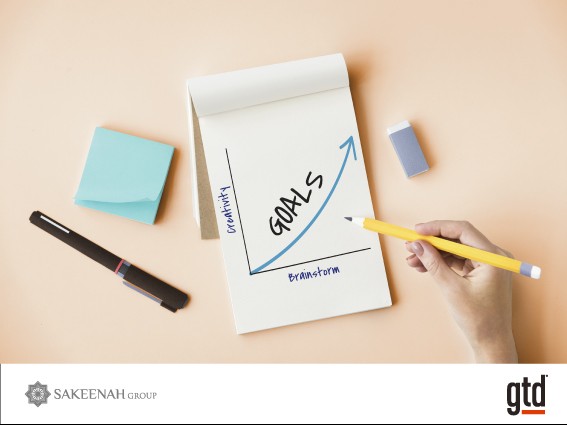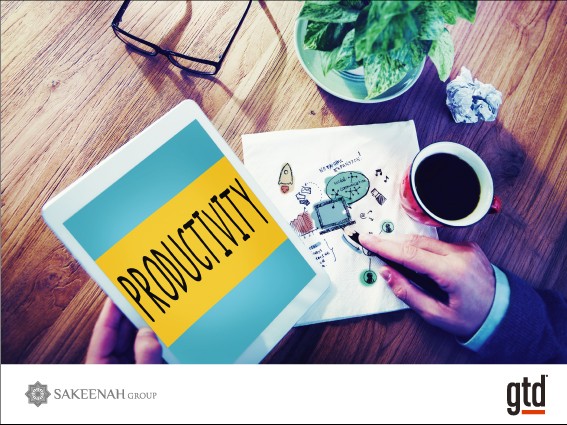5 Ways Productivity Training Benefits Your Workforce…and Boosts Your Bottom Line

As an organizational leader, what do you feel powers your business? Sales? Sure. But who powers the exchanges? Who drives the marketing to bolster those sales? Who commands the financial tractions and accounting? Who fuels all the other functions in between?
Your employees.
Employees are your power hub for your business. When workers function at optimal productivity, your company operates at optimal success and profit. The Bureau of Labor and Statistics defines productivity as “a measure of economic performance that compares the amount of goods and services produced (output) with the number of hours worked to produce those goods and services.”
The higher the output in the fewest hours, the greater the productivity, which equates to larger profit margins.
How Productive Are Your Employees?
Is your staff reaching their full productivity potential? Are you sure? Often employees harbor a vague idea of what it means to be productive that translates to being ‘busy.’ But busy workers aren’t always productive workers. They may work hard, long hours, but do not produce a meaningful output. What will help them realize the difference between productive and busy? Productivity training.

Giving workers the specific tools and strategies to fine-tune their productivity will yield much better results than merely telling them to be more productive. Training provides targeted guidance and actionable strategies that can help employees reach their optimal productivity -and help you increase your profit margin – up to 24 percent higher, according to the Association for Talent and Development.
Let’s look at five ways productivity training can benefit your workforce and your business.
1. Boosts Job Satisfaction
The progress principle suggests: “Of all the things that can boost emotions, motivations, and perception during a workday, the single most important is making progress in meaningful work. And the more frequently people experience that sense of progress, the more likely they are to be creatively productive in the long run.”
This idea simply means success begets success. The more productive your staff feel, the more they will want to produce. Helping employees develop the skills to do so will facilitate their desire and success.

2. Improves Employee Retention Rates
Worker retention impacts your budget. Employee turnover costs organizations around 50 percent of each entry-level worker’s salary, 125 percent of a mid-range manager, and an average 200 percent for executives. So, for a $60,000 management position, you might spend $75,000 on a new hire. The professional and business service industries alone saw more than a 63 percent churn rate in 2019 – that’s a significant chunk of your budget going towards turnover. You want to target your resources towards keeping staff happy, not continually acquiring new ones.
Productivity training can help your staff experience greater satisfaction, which in turn will perpetuate loyalty. A happy employee is a long-term employee. Workers who feel accomplished and successful in their positions are more likely to stick around.
3. Promotes Worker Engagement
A Dale Carnegie survey revealed that workers who feel actively engaged outperform those who don’t by a whopping 202 percent. Yet, Gallup found that 60 percent of employees are not engaged in their positions.
Productivity training can help spur employees’ engagement. It can bring greater awareness to their actions and how they approach tasks, and helps direct focus on setting and achieving goals. And again, consistently productive workers enjoy the subsequent success; they feel accomplished. This, in turn, facilitates a deeper engagement and connectivity to their actions.
4. Heightens Time-Management Awareness
A productivity article would be remiss without mention of time-management. Office workers, particularly in smaller businesses, often hold positions that bear multiple responsibilities, confronting them with scores of decisions every day about what to do, how to do it, and when.
Workers can quickly get off course with interruptions and random tasks, such as checking and responding to emails that aren’t urgent. The Information Age has ingrained an expectation and assumed obligation of immediacy. We send an email and expect a response quickly; we receive a phone call and feel compelled to answer - sacrificing our focus and momentum on the more important task at hand.
This task-derailing leads to lower productivity - it goes back to being busy without accomplishing any one project.

Also, mobile devices tend to blur the line on work hours. Employees may feel less inclined to complete projects within a specific time frame at the office as they can put them off to be revisited at home…but then personal distractions take over.
Productivity training provides your staff with tools to help cultivate an awareness of how they spend their time and how easily they can sail off course. The next time their email notification pings, they will think twice before changing tact on tasks that can wait.
5. Eases Delegation
Sometimes high-level workers are hesitant to delegate work to others, feeling that they’re skirting responsibilities or that the best way to get something done is to do it themselves. But this can lead to unrealistic workloads that, in the end, congest the process rather than speed it up.
Productivity training teaches staff how to delegate work without guilt or hesitation. The delegation of tasks can also enrich trust with subordinates and coworkers, which can spur their motivation and productivity.
Your Return on Investment (ROI)
Many organizations might feel that productivity training is a luxury in which only mega-corporations participate. But when you look at worker satisfaction statistics and the cost of employee turnover, you may find that forgoing productivity training costs more in the long run. In fact, the investment can yield valuable returns for the duration of their tenure – a one-time expenditure that bears endless returns.
Swadeck Taher OSK is a Chartered Accountant (ICAEW) and a Chartered Marketer (CIM) running businesses and coaching, consulting, mentoring CEOs and entrepreneurs ranging from startups through family businesses to established top 100 companies in Mauritius. He enjoys sharing the expertise he developed over the last thirty years at senior leadership/directorship level with his clients, business partners and other budding entrepreneurs.
Swadeck is also a GTD Practitioner and a Certified GTD Trainer. He helps others experience what the Productive Experience feels like and how they too can savour stress free productivity.
Sakeenah Co Ltd is the only Certified International Partner of the David Allen Company in Mauritius.
GTD® and Getting Things Done® are registered trademarks of the David Allen Company.
Disclaimer: All images are copyright to their respective owners. If any of the images used in this article belongs to you and you wish these removed, please send me a message and I shall oblige.
Explore Our Blog
Discover expert insights, tips, and the latest updates curated just for you.


